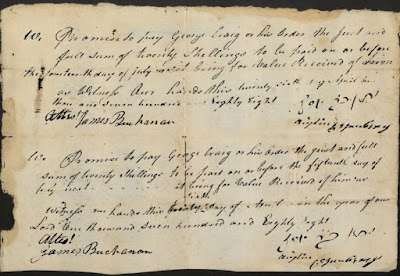My
4th Great Grandmother Eve and husband Warner Peters responded to the
complaint filed in Superior Court of Chancery at Staunton, Virginia June 7,
1816 by some of her siblings. You can read my blog summarizing her answer here.
A
few weeks later 4th Great Granduncle Peter Hanger got busy with his
official answer to the Plaintiffs’ suit known as ‘Augustine Argenbright &
wife, etc. vs Peter Hanger, etc.’
Peter
admitted his father’s will in court June 25, 1816. (A court clerk prepared a
transcription of Frederick’s will included in the chancery file.) Frederick
Hanger bequeathed his lands to his two youngest sons Peter and Charles. They
were supposed to pay their siblings the value of the land. Frederick Hanger
instructed Peter and Charles to pay their siblings 600 Pounds. The 600 Pounds
was to be divided equally among their 11 siblings payable on a yearly basis
beginning with the youngest sibling continuing to the eldest.
In
his answer, Peter states he purchased the land bequeathed to Charles. Peter
told the Court he and Charles didn’t consider themselves bound by their
father’s will; he had already paid sisters Catherine (and husband John Wise), Betsey
(and husband Jacob Thomas), Ann Eliza (and husband Peter Eagle) and Elizabeth (and
husband George Eagle).
John Wise Receipt, Image
76, 1819-003 Chancery Cause 1819-003 ‘Augustine Argenbright & wife, etc. vs.
Peter Hanger, etc.
Jacob Thomas Receipt,
Image 56, 1819-003 Chancery Cause 1819-003 ‘Augustine Argenbright & wife,
etc. vs. Peter Hanger, etc.
Peter and Ann Eagle
Receipt, Image 53, 1819-003 Chancery Cause 1819-003 ‘Augustine Argenbright
& wife, etc.vs. Peter Hanger, etc.
George Eagle Receipt,
Image 62, 1819-003 Chancery Cause 1819-003 ‘Augustine Argenbright & wife,
etc. vs. Peter Hanger, etc.
As
you can see from the receipts above, Peter’s statements were true. Although
this doesn’t seem to be the full amount they were owed (about 54 Pounds plus
interest). Peter reported he had paid his brother George Hanger 21 Pounds.
Peter
further tested the boundaries of his father’s will when he proposed that
Charles and he were entitled to an equal share reducing the legacies to each
Hanger sibling. Since he bought Charles’ land, he wanted Charles’ share too.
Here’s
what was written in Great Grandfather Frederick’s will:
“I order and appoint
that my land be Divided between my two sons Charles and Peter so that the run
or water Course Shall be the Dividing line and Charles to have the east side
and Peter the west side they paying as
follows for the same that is to say Charles to pay two hundred and fifty pounds
and Peter Three hundred and Fifty pounds to be divided Among my other
children as is after Directed and the said Charles and Peter their heirs or
assigns shall fully and freely Enjoy sd land for ever:”
Great
Grandfather Frederick gifted his youngest sons with a clear title to his lands.
It sounds like Frederick wanted his remaining 11 children to get an equal 1/11th
share (rather than 1/13th) but you can decide for yourself.
Peter
thought his father wished to postpone any payments to the legatees until after the
death of his wife, Eva Margreta Mayer. Great
Grandfather’s last will and testament stipulated:
“To my well beloved
wife Eve one third of the profits of my land During her natural life one horse
and one Cow and one bed and furniture and six pounds yearly out of my Estate
and one Iron Pot”
There’s
no doubt Frederick wanted Peter and Charles to provide for their mother during
her lifetime. When Peter answered the complaint June 25, 1816, Eve Margreta was
then living.
Eve
would have been entitled to dower rights; traditionally this was 1/3 of the
estate. Who can say what Great Grandfather Frederick’s intentions were? He passed almost 17 years earlier. Did he
want all his children to wait for their inheritance? That’s a long wait.
The
Chancery Court will decide ….
To
view the 1819-003 Chancery Cause ‘Augustine Argenbright & wife, etc.
vs.
Peter Hanger, etc.’ on the Library of Virginia website click here
Earlier
Chancery Cause 1819-003 blog posts










